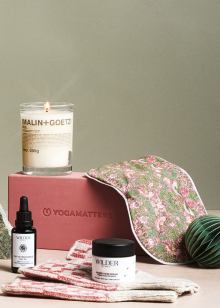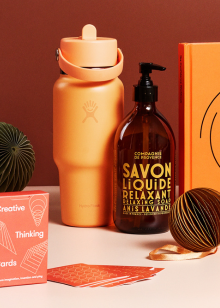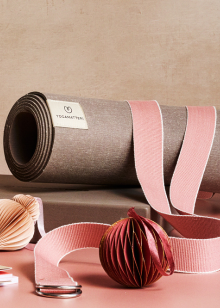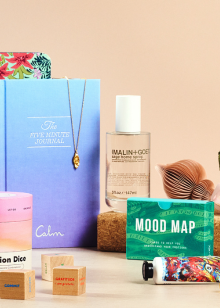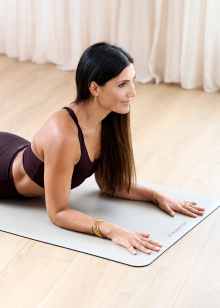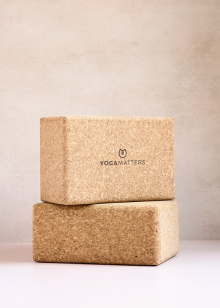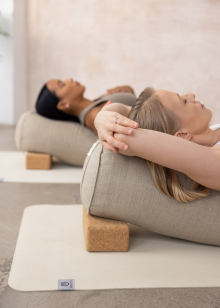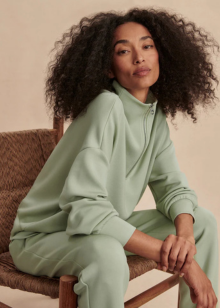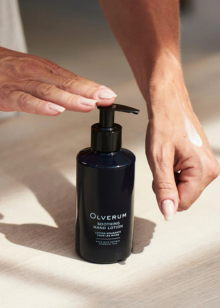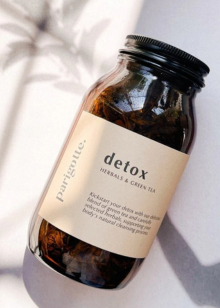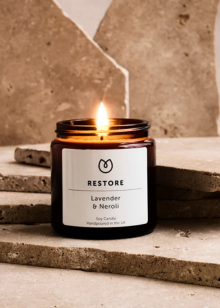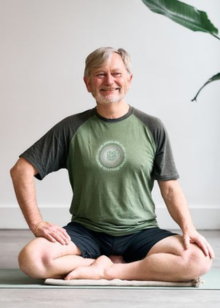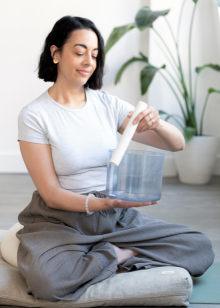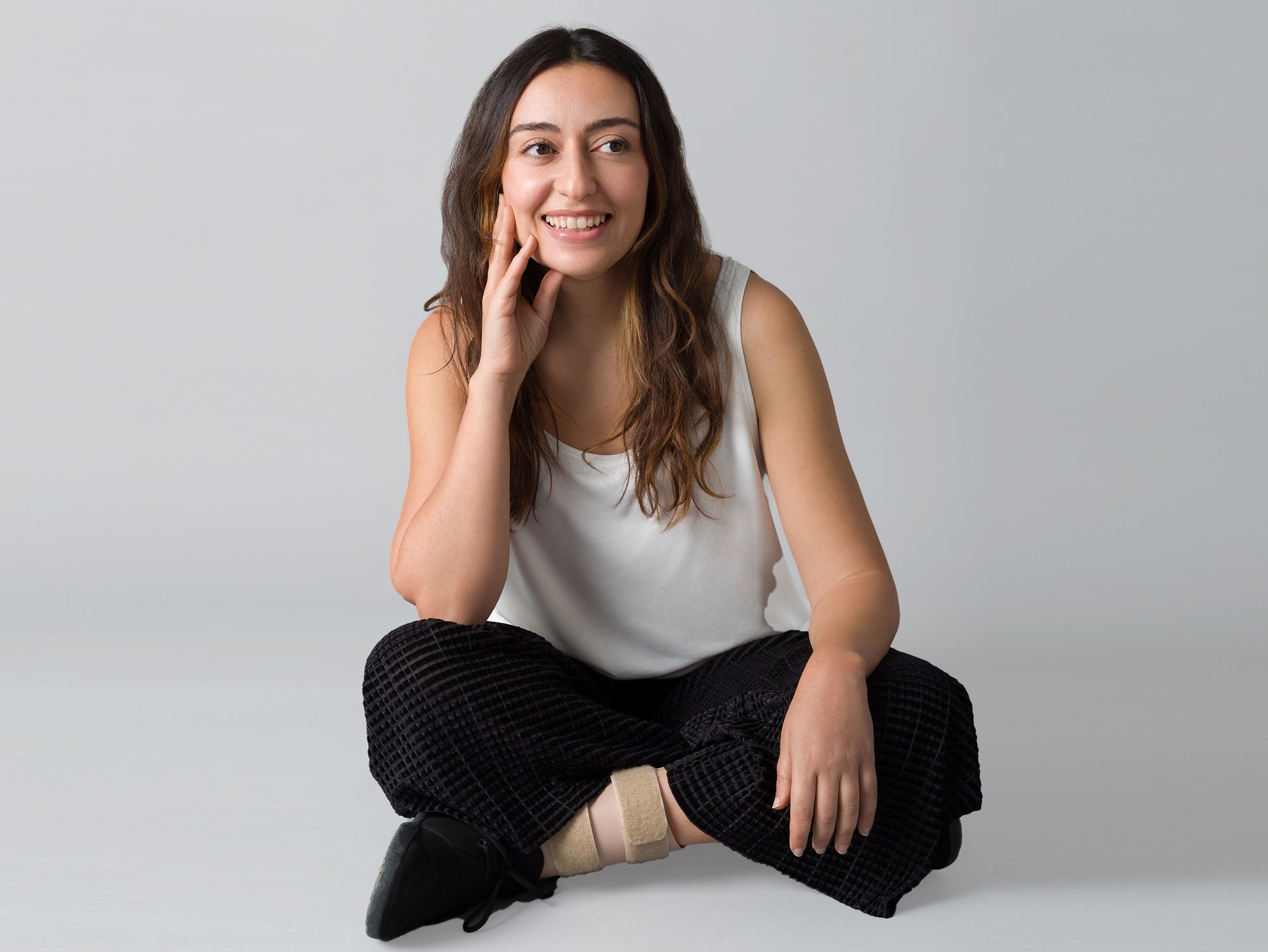Dina is a registered Nutritionist (mBANT CNHC) and founder of Vitamin Dina, which provides inclusive nutritional support for diverse bodies. As a working mum with a disability, Dina aims to make nutrition accessible to those with additional challenges, such as limited time, energy and mobility, and creates free resources, including her signature 5-Minute Meals e-book to help simplify mealtimes.
As part of Disability Pride Month, we caught up with Dina to learn more about how her disability inspires her work and how wellness can be more accessible and inclusive.
Tell us a bit about your background and your health journey…
I’m a British-Iraqi nutritionist, living in east London with my partner Iain and our very energetic toddler. I have a spinal condition from birth, which affects my mobility and balance.
I have always had a natural interest in health and the human body, due to life long experience of navigating my condition and the healthcare system. So it made sense that I’d end up doing something health-related, but I actually started my career in design.
A combination of mysterious symptoms and a positive midlife crisis led me to retrain as a nutritionist. I was working long hours as a designer, with stressful deadlines and exhausting commutes, which left me consistently run down, with one illness after the next and just trying to get through each day, fuelled by snacks.
When I sought out nutritional support, I struggled to find resources that catered for people like me. Much of the mainstream advice was just not achievable, from cooking every meal from scratch to walking 10,000 steps a day, I was shamed into feeling lazy if I couldn’t achieve those things. I found myself delving deep into nutrition and tailoring advice to my abilities, which eventually led to the creation of Vitamin Dina.
What is your mission with Vitamin Dina?
When I first qualified as a nutritionist, it felt like I was gatecrashing the industry. I didn’t know any wellness practitioners with disabilities and I questioned whether I could advise people on their health if I didn’t ‘look’ healthy. After a few words with myself, and others, I soon realised that my difference was my strength and this was an opportunity to support diverse communities that are wildly underrepresented in the wellness space.
I know firsthand the barriers that minorities face in the ‘exclusive’ wellness industry, so I aimed to create an inclusive space that acknowledges and celebrates the uniqueness of each individual, with accessible and achievable advice, and without the pressures to look a certain way or strive for perfection.
It’s about maximising nutrition with minimal effort, using shortcuts and practical tips, while considering ability, lifestyle and cultural background.
It is more than possible to feel healthy with a disability. Nutrition advice can be tailored to work with our abilities so we can thrive with our condition. The disability itself does not need ‘fixing’, it is what makes us who we are and part of the richness of human diversity.
Why is accessibility and inclusion important in wellness?
If people don’t see themselves represented, they can only assume it is not for them. Nutrition is often marketed to a narrow and privileged demographic, which alienates and discourages many people of different abilities, backgrounds, shapes and sizes from seeking out wellness services.
Everyone deserves to eat well and nourish their bodies and minds. Appropriate advice and representation makes people feel understood and empowered, and experience better health outcomes.
According to The Global Wellness Institute’s Future of Wellness 2022 Trends Report, consumers are tired of wellness as elitist hyper-consumerism, highlighting the need for more accessible, affordable and inclusive wellness that finally addresses underserved populations.
Around 17% of the UK population are disabled, and it is a minority group that anyone can join at any time. Accessibility benefits all. Including knackered parents, elderly people and anyone that is simply busy and tired.
What self-care advice would you give someone with limited energy or mobility?
Although the idea of self-care can feel like a luxury when you’re exhausted, it’s essential for replenishing our energy, and it doesn’t need to be perfect:
- Nourish your body with enjoyable and easy-to-prepare foods. Embrace convenience foods such as pre-chopped, pre-cooked, canned and frozen ingredients that save you precious time and energy.
- Explore physical activities that don’t feel like punishment – swimming, dancing, stretching or seated yoga. Find ways of moving that honour your body’s abilities and encourage flexibility and strength within your limits.
- Prioritise rest and be kind to yourself. Celebrate the small wins, especially on the difficult days, as you cannot be a superhero every day.
- Seek out supportive communities online that truly understand your challenges and triumphs. I recommend following Nina Tame for lighthearted disability myth-busting.
- Aim for daily simple pleasures – sing your heart out or eat an ice cream without guilt, because nutritional value is irrelevant when it’s good for the soul.
What is your experience of yoga and would you recommend it to someone with a physical disability?
While every disability is different, it’s always surprising that I am the only disabled person in my yoga class, as yoga can be especially beneficial for people with disabilities, in terms of strength, balance, flexibility and mental health. But it’s also not surprising because classes are often inaccessible and it is usually unclear if mobility limitations are catered for.
I started out doing one-to-one yoga and it took years before I felt brave enough to join a group class. There is the perception that yoga is exclusively for bendy, sculpted bodies that can balance beautifully on one leg. And there is also the unpredictability of turning up and wondering if the instructor would know what to do with me, if I would be put on the spot or feel like a burden.
Fortunately, most experienced yoga teachers are more than happy to accommodate different needs, and have made seamless adaptations without drawing too much attention to myself. However, it’s important that accessibility information is provided on websites and social media to ensure that people of all abilities feel acknowledged and welcome to participate without having to apologetically ask, as disclosing your medical information to strangers can be daunting.
Adaptive yoga and seated classes are becoming more available, as well as supportive props and chairs. Accessible yoga teacher Rodrigo Souza states that ‘by creating different asana variations, you can customize a routine to perfectly suit anyone, including people with paralysis, chronic fatigue, muscle weakness and more.’
Over time I have gained more confidence in attending yoga classes as it plays a significant role in my wellbeing. So I would encourage more disabled people to give yoga a try and confidently request their needs, even if it is terrifying at first, as our presence in these spaces needs to be normalised.
What does disability pride mean to you?
Disabled people are often undervalued in society, so having pride in our disability can seem like an unusual concept. But disability is not sad or tragic, it is not necessarily good or bad either, it is part of what makes us just as unique as everyone else. Uniqueness should be celebrated, not pitied or feared.
Don’t get me wrong, having a disability is hard and it has taken decades to fully accept and embrace who I am, but the hardest parts have not been the actual disability. It has been the discrimination, the lack of basic access and the societal barriers.
Disability Pride Month raises awareness and celebrates the largest minority group in the world. It’s a reminder that disabled people should not be underestimated, they have to work harder than the average person to be accepted, to access opportunities and achieve success, they are naturally resourceful and determined individuals, because they have to be. My disability has given me a unique perspective, with more empathy, resilience and purpose. I wouldn’t be who I am if I wasn’t disabled, and I can take pride in that.
To learn more about Vitamin Dina, visit her website or check her out on social media:
Website: vitamindina.com
Instagram: vitamin.dina
You can read more about Disability Pride Month here: https://www.thevaluable500.com/spotlight/disability-pride-month
